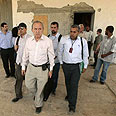
'Difficult to hear.' Goldstone in Gaza
צילום: רויטרס
UN war crimes inquiry on Gaza wraps up hearings
'Extent of physical damage shook all of us,' says head of investigation into recent Israeli offensive in Strip, adding ' aim is to show the human side of suffering and give a voice to victims'
United Nations war crimes investigators on Tuesday wound up four days of public hearings about Israel's invasion of the Gaza Strip after taking painful testimony from both Israelis and Palestinians.
Richard Goldstone, a former chief UN war crimes prosecutor heading the four-person inquiry team, said he expected to submit its report to the UN Human Rights Council next month.
"The testimony we have heard has been very difficult to hear," he told a news briefing. "The aim is to show the human side of suffering and give a voice to victims so they are not lost among statistics."
According to a Palestinian rights group, 1,417 people including 926 civilians were killed during Israel's December 27-January 18 offensive in the Hamas-ruled territory of 1.5 million people.
Israel lost 10 soldiers and three civilians in the fighting, which it launched with the declared aim of halting cross-border rocket fire by militants. It has estimated 1,166 Palestinians were killed, 295 of them civilians.
Activists had called for an independent investigation into the conduct of Israeli troops in Gaza, including the destruction of several residential areas and the firing of artillery shells containing white phosphorous which can cause severe burns.
Israel has said an internal probe by its armed forces found no evidence of serious misconduct by Israeli troops.
'Premature to talk about findings' outcome'
Lt. Col Raymond Lane, chief instructor in the Irish Defence Forces School, reported to the UN inquiry about weapons used in the conflict.
"Through our studies we found no actual proof a DIME round was used," he said, referring to dense inert metal explosives.
But referring to samples containing heavy metals such as tungsten and cobalt, analysed in a forensics laboratory in Dublin, he added: "I am of the view that some weapons systems used in the conflict definitely had some DIME components."
White phosphorous can provide cover for troops but also causes burns, he said. "It is horrible stuff."
Gazan terrorists had used low-quality rockets, which lack a guidance system and take about 90 seconds to set up and fire, according to Lane. "They are basically fire and forget."
Goldstone's expert team held twin sessions of hearings in Gaza and Geneva, where the Human Rights Council is based.
Israel, which has accused the Council of bias against the Jewish state, did not cooperate with the fact-finding mission.
The UN human rights investigators entered Gaza through the Rafah crossing point from Egypt, as Israel denied them access to the coastal strip as well as to the West Bank.
"Obviously on this mission, visiting Gaza was very important, not only to listen to people but to see the physical damage. That shook all of us, the extent of it," Goldstone said.
The inquiry would send written questions to the government of Israel, the Palestinian Authority and Hamas authorities seeking further information to clarify testimony, he said.
"Our report is due to be completed in the early part of next month and it will be presented to the Human Rights Council in September," he said. "It is obviously premature to talk about the outcome of our findings."










